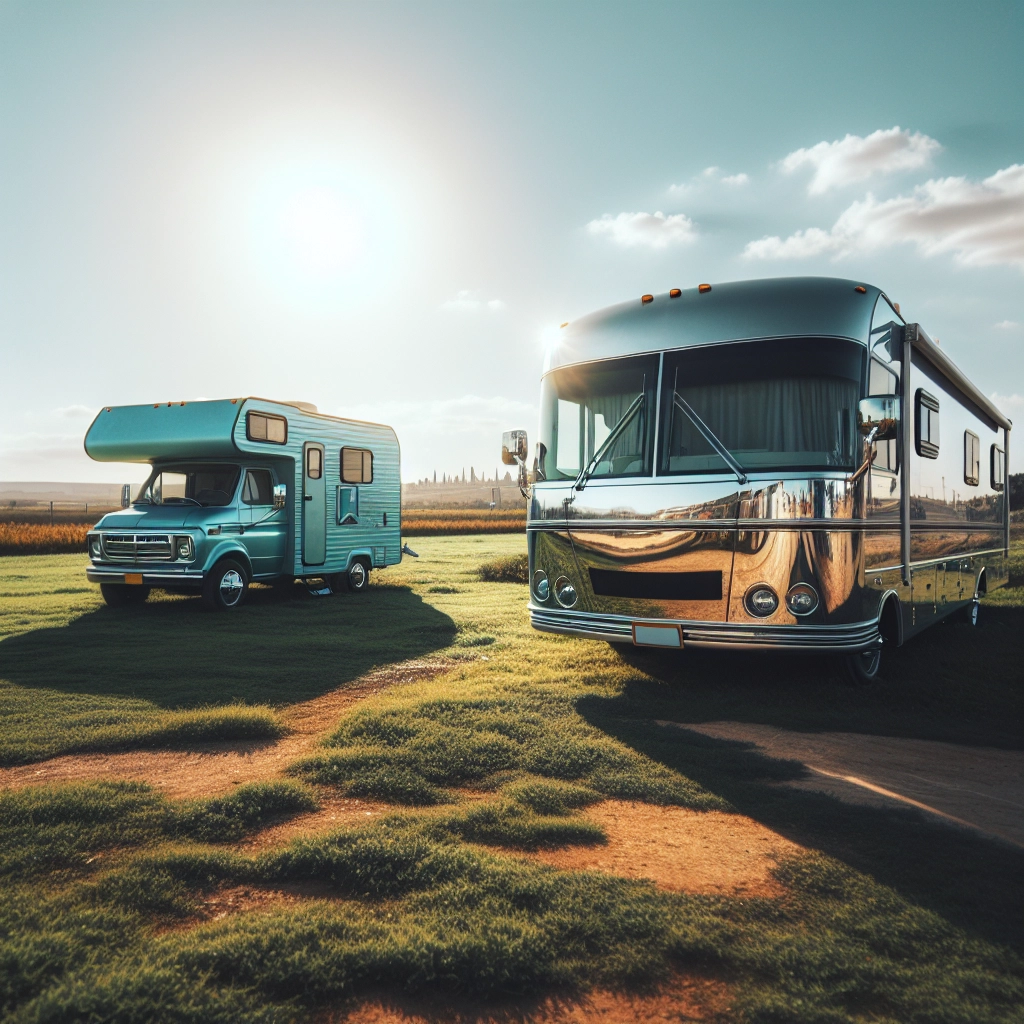Table of Contents

Unlocking the Freedom of Boondocking: The Solar Advantage
Imagine waking up to the serene view of a secluded lake or the majestic beauty of a forest, with not a power line in sight. This is boondocking – camping without hookups – and it’s the ultimate symbol of freedom for many RV enthusiasts. But with freedom comes responsibility, and that’s where portable solar panels shine. They’re your silent power partners, making sure you’re never tethered to a campground’s electrical grid, giving you the liberty to explore the great outdoors on your own terms.
Article-at-a-Glance
- Boondocking offers unmatched freedom and portable solar panels make it sustainable.
- Solar panels help maintain your RV’s batteries, powering your adventures off-grid.
- Choosing the right solar setup depends on your energy needs and travel style.
- Portability and performance are key when selecting solar panels for your RV.
- Investing in solar technology increases your RV’s value and your quality of life.
What is Boondocking and Why Solar?
Boondocking, or dry camping, is the practice of parking your RV in a place without the usual amenities like water, sewer, or electricity. It’s about getting closer to nature and away from crowded campgrounds. But to do this successfully, you need a reliable power source. Enter solar power – clean, quiet, and as boundless as your wanderlust. It’s the perfect companion for those who want to minimize their environmental footprint while maximizing their travel experiences.
- Self-sufficiency: Solar power allows you to generate your own electricity.
- Cost-effective: Save money on campground fees and reduce generator fuel costs.
- Eco-friendly: Reduce your carbon footprint and connect with nature responsibly.
- Quiet operation: Enjoy the sounds of nature without the noise of a generator.
The Limitless Power of the Sun
The sun is a powerhouse of energy, and harnessing it for your RV is easier than you might think. With the right setup, you can capture solar energy to charge your batteries, power your appliances, and keep your lights on as the stars come out. Best of all, this energy source is renewable, meaning you can rely on the sun day after day to fuel your off-grid adventures without harming the planet.
Choosing Your Solar Companion: Factors to Consider
When you decide to go solar, it’s not just about picking any panel off the shelf. You need to consider your energy consumption, the space you have available, and how often you’ll be on the move. Think of it as choosing a travel partner – compatibility matters. Your solar setup should match your lifestyle, ensuring you have enough power without weighing you down.
Power Needs: Sizing Your System
To size your system correctly, start by calculating your daily power usage. This includes everything from lights and laptops to refrigerators and fans. Once you know your energy needs, you can determine how many panels you’ll require to keep your batteries happily charged. Remember, it’s better to overestimate your needs slightly than to fall short when you’re miles from the nearest outlet.
Example: If your daily energy usage is 1 kWh, and you expect about 5 hours of good sunlight per day, you’ll need panels that can generate around 200 watts of power.
But it’s not just about wattage. You’ll also want to consider the efficiency of the panels and the type of batteries you have. This ensures that every ray of sunshine is put to good use, keeping your lights on and your gadgets charged.
Portability vs. Performance: Finding Your Balance
Portable solar panels offer the convenience of easy setup and flexibility to move with the sun. However, they might not always provide the same power output as their rooftop counterparts. It’s about finding the sweet spot between how much power you need and how mobile you want to be. If you love the idea of chasing the sun for the best solar gain, portable panels are your go-to. But if you prefer a set-it-and-forget-it approach, consider a fixed system that can capture solar energy even while you’re on the move.
- Portable panels are easy to set up and adjust for optimal sun exposure.
- Fixed systems are low-maintenance and can continuously charge, even while driving.
- Consider how often you move your RV when deciding between portable and fixed panels.
Durability for the Road Less Traveled
Portable solar panels need to withstand the rigors of the road – from bumpy trails to extreme weather. Look for panels with a robust build, resistant to impact and corrosion. They should be able to endure high winds and heavy rains, ensuring that no matter where you roam, your power source remains intact. A good set of panels can last you many years, making them a reliable companion for all your adventures.
- Impact-resistant materials protect against falls and flying debris.
- Corrosion resistance is key for humid climates and seaside escapes.
- Quality panels are tested to withstand extreme weather conditions.
- A longer lifespan means more adventures powered by the sun.
Compatibility With Your RV Systems
Not all solar panels will play nice with your RV’s existing systems. It’s essential to ensure that your solar setup is compatible with your RV’s battery type and voltage requirements. This means checking the specifications of your charge controller and inverter, if you have one. A mismatch can lead to inefficient charging or, worse, damage to your system. When in doubt, consult with a professional to make sure everything aligns for smooth solar sailing.
Cost Analysis: Upfront Investment vs. Long-term Savings
Yes, there’s an upfront cost to going solar, but think of it as an investment in your travel future. The initial expense of buying and installing solar panels is offset by the savings on campground fees, generator fuel, and maintenance. Over time, solar panels pay for themselves and then some. Plus, they can increase the resale value of your RV, making them a smart financial move as well as an environmentally friendly one.
- Initial costs are recouped through savings on traditional power sources.
- Solar panels require minimal maintenance, reducing ongoing expenses.
- The value added to your RV can make it more attractive to future buyers.

Embracing Energy Independence with Portable Solar Panels
With portable solar panels, you take the reins of your energy needs. No more searching for hookups or running a noisy generator. You have the freedom to camp wherever you want, for as long as you want, all while being kind to the environment. Energy independence means peace of mind, knowing that as long as the sun rises, you’ll have the power you need to fuel your lifestyle.
The Eco-Friendly Approach: Green Power on the Go
Using solar panels is a step forward in preserving the natural beauty you set out to explore. They produce no emissions, no noise, and no pollution. This green approach to power not only benefits the environment but also aligns with the core values of many in the RV community who seek to leave no trace and travel sustainably.
Banish the Generator: Quiet and Clean Energy
Generators have long been a necessary evil for off-grid RVing, but solar power offers a welcome respite. Solar panels operate in silence, allowing you to enjoy the peacefulness of your surroundings without the disruptive hum of a generator. They also eliminate the need to carry fuel and the worry of spills or fumes, making your RV a cleaner, safer place to live and travel.
The Long-term Benefits of Reduced Utility Dependence
Embracing solar power is not just about the here and now; it’s about securing a sustainable future. By reducing your reliance on utility grids and fossil fuels, you’re not only saving money, but you’re also cushioning yourself against rising energy costs. With a solar-equipped RV, you’re investing in a lifestyle that is both cost-effective and environmentally conscious, ensuring that your travels are powered for years to come.
Installation Simplified: Setting Up Your Portable Solar System
Getting your solar panels up and running is less complex than you might think. With a few straightforward steps, you can have your system soaking up the sun’s rays in no time. The key is to plan your setup carefully, ensuring that everything is in place for optimal performance. Let’s walk through the process together.
Choosing the Right Location for Maximum Sun Exposure
The perfect spot for your panels is one that sees plenty of sunlight throughout the day. Avoid shaded areas and consider the path of the sun across the sky. An open space on the ground or the roof of your RV, where shadows from trees and other structures are minimal, will give you the best results. Remember, even a little bit of shade can significantly reduce the efficiency of your solar panels.
Securing and Connecting Your Panels
Once you’ve found the ideal location, it’s time to secure your panels. If you’re using portable panels, they often come with kickstands or mounting solutions that make setup a breeze. Make sure they’re anchored well to withstand wind without shifting out of optimal sun exposure. Connecting your panels to your RV’s power system is usually as simple as plugging them into a solar charge controller, which regulates the power going into your batteries, keeping them safe and extending their lifespan.
Monitoring and Optimizing Power Output
With your panels in place, monitoring the system ensures you’re getting the most out of your investment. Keep an eye on the charge controller’s display to track how much power you’re generating and how much is being stored. Adjust the angle of your panels throughout the day to follow the sun’s arc, maximizing their exposure and increasing their efficiency. It’s all about making small tweaks for the biggest gains.

Navigating Challenges: Maximizing Efficiency in All Conditions
Even the best solar setups can face challenges. Whether it’s a stretch of cloudy days or unexpected rain, it’s important to know how to keep your system running smoothly. Let’s look at some common hurdles and how to overcome them.
Dealing With Inclement Weather: Cloudy Skies and Rain
Clouds and rain can put a damper on your solar power generation, but they don’t have to leave you in the dark. High-quality panels can still draw energy even on overcast days, albeit at reduced efficiency. If rain is in the forecast, make sure your panels are clean beforehand; the rain will help wash away any dust or debris, keeping them efficient once the sun returns.
Panel Care: Routine Maintenance for Peak Performance
Maintaining your solar panels is straightforward and doesn’t require much time. Regularly cleaning the surface of the panels with a soft cloth and soapy water removes dirt and grime that could block sunlight. Inspect the cables and connections for signs of wear or damage, and ensure that all components are dry and secure. This simple care routine will keep your panels working at their best for years to come.
Battery Management: Storing Your Solar Power for Later
Having a reliable battery system is crucial for making the most of your solar panels. After all, the sun doesn’t shine 24/7, and you’ll want to have that energy available when it sets. Deep-cycle batteries are the storage units of your solar system, holding onto the power until you need it. To keep them in top shape, make sure they’re charged regularly and not drained too low. This will extend their life and ensure they’re ready to power your off-grid adventures anytime.
- Choose deep-cycle batteries designed for solar storage for best results.
- Maintain a regular charging schedule to prolong battery life.
- Monitor battery levels to avoid over-discharging, which can cause damage.
- Consider a battery management system for optimal charging and discharging.
The Adventure-Ready Solar Toolkit: Must-Have Accessories
Equipping your RV with solar panels is just the beginning. To truly harness the power of the sun, you’ll need a few key accessories. These essentials ensure that your solar system operates smoothly and efficiently, providing you with reliable power wherever your travels take you.
Essential Extras: Adapters, Cables, and Storage
Adapters and cables are the lifelines of your solar setup, connecting your panels to your RV’s power system. It’s important to use high-quality cables that can handle the electrical load and resist the elements. Additionally, having a secure storage solution for your portable panels will protect them during transit and ensure they’re always ready for use.
- Quality cables and connectors prevent power loss and ensure safety.
- Weather-resistant adapters are essential for outdoor use.
- Durable storage bags or cases protect your panels while not in use.
The Importance of a Good Charge Controller
A charge controller is the heart of your solar power system. It regulates the flow of electricity from your panels to your batteries, preventing overcharging and damage. A good charge controller will also maximize the lifespan of your batteries by ensuring they’re charged in the most efficient way possible. Look for controllers with features like MPPT (Maximum Power Point Tracking) for the best performance.
- Prevents battery overcharging and extends battery life.
- MPPT technology ensures maximum efficiency from your panels.
- Displays and monitors give you real-time insight into your system’s performance.
Power Inverters: Getting the Right Voltage for Your Devices
While your solar panels and batteries deal in direct current (DC), many of the appliances in your RV require alternating current (AC). That’s where power inverters come in. They convert the DC power stored in your batteries into the AC power needed to run everything from your laptop to your coffee maker. Ensure you choose an inverter that can handle the power demands of all your devices.
- Choose an inverter with enough capacity for your appliances.
- Pure sine wave inverters provide clean power for sensitive electronics.
- Look for inverters with safety features like overload protection.
Realizing the Resale Boost: How Solar Adds Value to Your RV
When it’s time to upgrade or change your RV, having a solar power system can significantly increase its value. A solar-equipped RV is not only more attractive to potential buyers but also demonstrates a commitment to quality and sustainability. It’s an investment that pays off in the long run, making your RV stand out in a crowded market.
Attracting Eco-conscious Buyers
Today’s RV buyers are more environmentally aware than ever before. They’re looking for rigs that reflect their values, and a solar power system does just that. It shows that you care about reducing your carbon footprint and that you’ve invested in the RV’s long-term performance and self-sufficiency. This can be a powerful selling point that sets your RV apart and attracts a growing market of eco-conscious adventurers.
- Solar panels appeal to buyers looking for green, off-grid capabilities.
- An RV with solar power is seen as modern and up-to-date.
- Eco-friendly features can command a higher resale price.
Illustrating Cost Savings to Prospective Owners
When it’s time to pass on the keys to your RV, showcasing the solar setup as a cost-saving feature is a must. Prospective owners will be interested in how the solar panels will reduce their expenses over time. Break down the math for them. Show them the potential savings on campground fees, generator costs, and even maintenance. With a solar-equipped RV, the new owners will be looking at a future where the sun doesn’t just light up the sky—it lights up their savings too.
- Highlight the reduction in dependency on paid campgrounds with electrical hookups.
- Emphasize the avoidance of fuel costs associated with traditional generators.
- Detail the low maintenance needs of solar panels compared to other power sources.
- Discuss the long-term savings on energy costs, especially with rising fuel prices.
FAQs: Solar Solutions for Boondocking Questions Answered
Can I Power My Entire RV with Portable Solar Panels?
Absolutely! The key is to have a solar panel setup that matches your energy consumption. Many RV owners successfully power their entire rig using solar energy. It involves calculating your daily power usage and ensuring you have enough battery capacity to store the energy you need for evenings and cloudy days.
How Do I Know How Many Panels I Need for Boondocking?
Start by listing all your electronic devices and their wattage. Then, estimate how many hours per day you’ll use each one. This will give you your daily energy usage. With that number in hand, you can determine the total wattage of solar panels needed to meet your energy demands based on the average sunlight hours at your typical destinations.
What Happens to Solar Panels During Transit?
Portable solar panels are designed for life on the move. They’re typically built with durable materials to withstand the vibrations and bumps of travel. When not in use, they should be securely stored in a padded case or in a designated area of your RV where they’re protected from damage.
Can Portable Solar Panels Charge in Indirect Sunlight?
Yes, they can, but at a reduced efficiency. Solar panels work best under direct sunlight, but they will still capture some energy on cloudy days or in shaded areas. The latest technology in solar panels, including MPPT charge controllers, helps to maximize the energy harvested during less-than-ideal lighting conditions.
How Does Weather Affect Portable Solar Panel Efficiency?
Weather can have a significant impact on the efficiency of solar panels. Cloud cover, rain, and snow can reduce their output. However, solar panels can still produce electricity in these conditions, just at lower levels. It’s important to factor in your local climate when sizing your solar system for boondocking.
In conclusion, portable solar panels offer a world of freedom for boondocking RVers. They provide the power to explore off-grid locations while being kind to the environment and your wallet. With a little planning and the right equipment, you can enjoy the comforts of home wherever you park. Embrace the solar lifestyle and turn every sunny day into an opportunity to generate clean, free energy for your RV adventures.
- Boondocking RVs: Flexible Solar Solutions – 3 March 2024
- Renewable Energy Tips for Full-Time Boondocking RVers – 2 March 2024
- Boondocking Solar Power Systems: Sizing Options & Solutions for Motorhomes – 1 March 2024
